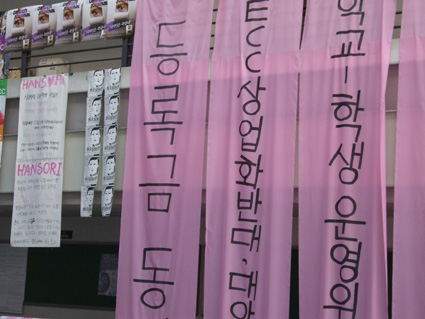
When the president of the Korean Council for University Education participated in the audit conducted by the National Assembly on October 21, he made an official statement against the proposed bill to put a ceiling on university tuition fees. This announcement signals to many that university tuition will increase again in 2009, as universities always did in the past with the coming of a new year.
Inflation caused by worldwide economic problems is one reason cited for the expected rise. Another reason cited for tuition rises is school development. According to an online article released by the Christian Broadcasting System (CBS) News,
However, many students think that the cost of tuition is already unreasonably high and that the money is not used for the right purposes.
“Last year, the school said it raised the tuition due to inflation. But it spent our tuition fee to build a new fountain,” said Song Seul-ki (
“My school did not announce it beforehand that they had raised tuition for 2008. I knew it when I received the bill. Moreover, students’ demands for welfare have not been answered despite high tuition fees,” said Kim Eun-jung (The University of Seoul, 2).
Student union members say it is often difficult to negotiate with their schools about the high tuition fees. “We have regular negotiations at the beginning of each new year. Also, currently, we have had informal gatherings to discuss the tuition fee issue. But the school did not give us specific answers, saying that it is not the right time to plan the 2009 budget,” said Oh Su-ji, a member of the executives in Sookmyung Women’s University’s Student Government Association.
“An informal gathering to deal with the tuition fee issue is just a nominal reason for the school to say that it has listened to student’s voice. The school always says that it is not the right time for discussion, but what students receive later without any notice is the bill stating the increased amount in tuition,” said Kang Jung-joo (Korean, 4), the president of the Student Government Association (SGA) at Ewha.
To break the vicious cycle of conflict over high tuition that takes place every year, some Ewha students, including the members of the SGA, have decided to take the unique step of petitioning the constitutional court. “The idea of planning for this movement by making a committee to petition the court was actually rejected during the meeting of all student representatives from different departments. However, the SGA decided to go with the committee, which had formed by members from Department of Education and Law, because members of SGA acknowledged the need for this movement,” said Kang.
This type of petition can be made against the government or public bodies if they have violated citizens’ rights. In this case, claimants are limited to freshmen students, as the petition should be made within a year of the violation. “The government has violated students’ basic right to receive education by allowing high tuition fees and not implementing any solutions,” said Kang. “The reason for this attempt was to make the tuition fee issue not only restricted within our school, but to expand understanding of high tuition fees as a social problem by acknowledging its seriousness,” said Kang.
So far, 700 people have signed up to support the movement. “As we started this movement from October, it was quite hard for us to proceed signature-seeking campaign because it fell on the mid-term exam period. However, signatures from 700 students were the result of setting self-signature tables around campus,” said Kang.
Many civil rights groups have become involved in the movement by providing legal advices and holding open discussions on the issue. “In order to develop it as a social movement, we are encouraging students from other schools to sign up for this petition. Also we are planning to cooperate with other schools as well,” said Kang.
The solutions proposed to relieve the deeply-rooted tension between students and universities regarding the tuition fee conflicts vary. “Universities should use their reserve funds to lower students’ tuition. Ensuring transparency in the use of reserve fund, universities need to reveal their financial reports to students as well. Also the government needs to set a maximum ceiling for tuition fees, so they cannot go up anymore,” said Lee Jin-sun, a staff member of the group People Power 21.
Universities should do their jobs as educational institutions, and the government needs to ensure people’s right to education by making efforts like expanding the budget for higher education. Also we, as a student, should be able to seek our own rights to education, not behaving tacitly,” said Kang.

